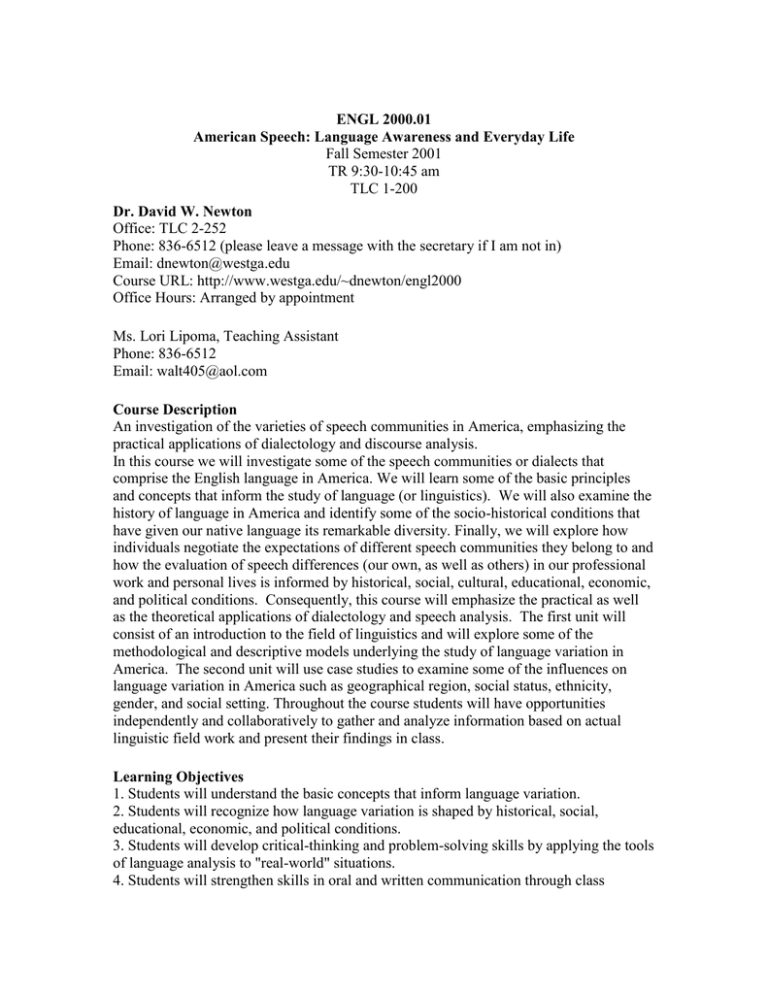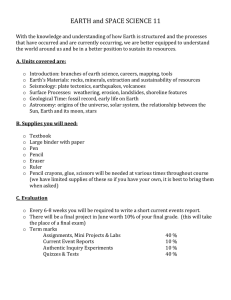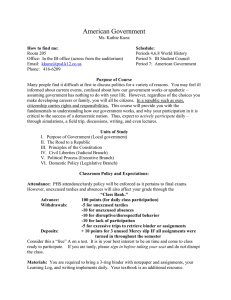Fall Semester 2001 TR 9:30-10:45 am TLC 1-200
advertisement

ENGL 2000.01 American Speech: Language Awareness and Everyday Life Fall Semester 2001 TR 9:30-10:45 am TLC 1-200 Dr. David W. Newton Office: TLC 2-252 Phone: 836-6512 (please leave a message with the secretary if I am not in) Email: dnewton@westga.edu Course URL: http://www.westga.edu/~dnewton/engl2000 Office Hours: Arranged by appointment Ms. Lori Lipoma, Teaching Assistant Phone: 836-6512 Email: walt405@aol.com Course Description An investigation of the varieties of speech communities in America, emphasizing the practical applications of dialectology and discourse analysis. In this course we will investigate some of the speech communities or dialects that comprise the English language in America. We will learn some of the basic principles and concepts that inform the study of language (or linguistics). We will also examine the history of language in America and identify some of the socio-historical conditions that have given our native language its remarkable diversity. Finally, we will explore how individuals negotiate the expectations of different speech communities they belong to and how the evaluation of speech differences (our own, as well as others) in our professional work and personal lives is informed by historical, social, cultural, educational, economic, and political conditions. Consequently, this course will emphasize the practical as well as the theoretical applications of dialectology and speech analysis. The first unit will consist of an introduction to the field of linguistics and will explore some of the methodological and descriptive models underlying the study of language variation in America. The second unit will use case studies to examine some of the influences on language variation in America such as geographical region, social status, ethnicity, gender, and social setting. Throughout the course students will have opportunities independently and collaboratively to gather and analyze information based on actual linguistic field work and present their findings in class. Learning Objectives 1. Students will understand the basic concepts that inform language variation. 2. Students will recognize how language variation is shaped by historical, social, educational, economic, and political conditions. 3. Students will develop critical-thinking and problem-solving skills by applying the tools of language analysis to "real-world" situations. 4. Students will strengthen skills in oral and written communication through class presentations and regularly assigned writing projects. 5. Students will appreciate how language variation is related to issues of professional vocation, cultural diversity, information technology, and lifelong learning. Textbooks Wolfram and Schilling-Estes, American English: Dialects and Variation. Blackwell, 1998. Course Packet, On Sale at Dittos on Maple Street (in Western Square) and on reserve in the library. Additional materials will be placed on the course website or on reserve in the library. Course Evaluation 05% Homework assignments 10% Presentation I 15% Presentation II 20% Final Course Project / Presentation 15% Examination I 15% Examination II 20% Final Examination Grading Scale Students will be assigned a letter grade for each assignment ranging from A+ to F based on the following numerical scale. The numerical grade will be used when calculating the final average at the end of the semester. 97-100 = A+ 94-96 = A 90-93 = A- 87-89 = B+ 84-86 = B 80-83 = B- 77-79 = C+ 74- 76 = C 70- 73 = C- 67-69 = D+ 64-66 = D 60-63 = D- below 60 = F Attendance Requirements Improving your critical thinking and presentation skills requires commitment and concentrated effort. Therefore, careful preparation and active participation are crucial to your success in this course. I expect you to be present and on time for all class meetings. Readings and other assignments should be completed in advance of each class. You should come prepared to participate actively in our class discussions. Because of the collaborative nature of our work, you should make every effort to be present and prepared when others are depending on you. If you are going to be absent from class, you should let me know, preferably in advance. Late work will not be accepted unless you make arrangements with me in advance and you have a legitimate reason (a serious medical or family emergency) for turning in work after it is due. In the case of excused absences, it is your responsibility to make arrangements with me to complete assignments you have missed immediately upon your return to class. Failure to follow these guidelines will result in a zero or grade reduction for work not submitted on time. You will not be able to make up missed in-class assignments or group work done in class, and you will not receive credit for these assignments. If you find it unavoidable to miss class, be aware of the following guidelines: a) No distinctions will be made between excused and unexcused absences. Four absences are allowed during the course of the semester. Every absence thereafter will result in a one-third letter grade reduction of your final grade in the course. b) Roll will be taken during every class period at the beginning of class. If you arrive late, it is your responsibility to let us know so you are not counted absent. c) It is your responsibility to keep up with your absences. d) You should use your allotted absences wisely. Unplanned or unexpected occurrences are likely, so be prepared to use absences for these events only. e) Entering class late and leaving class before it is over is distracting for me and others taking the course and will count as an unexcused absence, unless you have a legitimate excuse for doing so. Excessive absences or tardiness from class may result in your administrative withdrawal from this course with a grade of F. Homework Assignments and Classroom Activities Throughout this course you will be expected to complete homework assignments and inclass activities. These assignments are designed to reinforce the information presented in reading assignments and lectures, and they will help you prepare for the examinations. Some of these assignments will be collaborative (group work). Others will help you participate more actively in class discussions. You should be prepared to turn in all written assignments. You will not be able to make up assignments that are missed due to unexcused absences. Presentations One of the major goals of this class is to help you become more aware of how to use language effectively in public and professional settings. Therefore, you will be expected to complete three major class presentations as part of your grade in this course. Each presentation will help you learn more about the material we are studying in class and become more proficient at speaking in public. Presentations will be assessed on the basis on organization, clarity, and presentation style. We will provide you with instructions and a separate handout for each of these presentations as the course progresses. Examinations Examinations will be based on assigned readings, homework assignments and lectures (as well as other materials) presented in class. For each examination, you will be expected to know the major terms, concepts and theories related to the study of language and dialects that will be presented in reading assignments and course lectures. Consequently, you should be thoroughly familiar with each reading assignment before we discuss it and take notes during class. Each examination will contain an objective section (terms and definitions), identification questions, and short essays. Examinations cannot be taken late unless you have a serious medical or personal emergency. In the event that such circumstances arise, you must let me know in advance to schedule an alternate time to take the examination. Otherwise, late exams will be marked down one letter grade for each day they are late. Student/Faculty Conferences and Outside Assistance We will be glad to meet with you outside of class to discuss your work in this class, review lecture presentations, or discuss homework assignments and reading assignments. If you are having trouble with the material in this class or have questions and/or concerns you would like to discuss, please set up a time a meet with one of us. However, we will not help you with any work missed during unexcused absences. NOTE: Please make a xerox copy of all written work you turn in to me, in case it is misplaced or lost. Save your work on a computer disk! We will not give you credit for work you claim to turn in but that I do not have in my possession. UWG Technology / Surfing Guide: http://www.westga.edu/~techlife/



